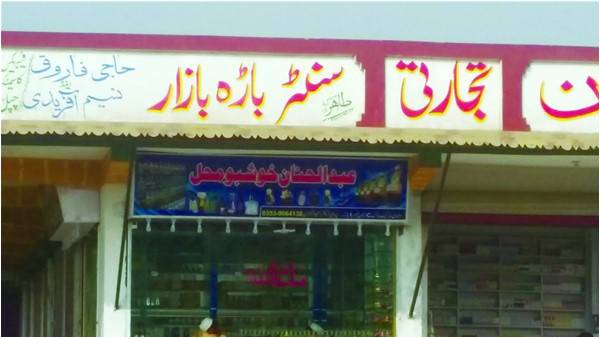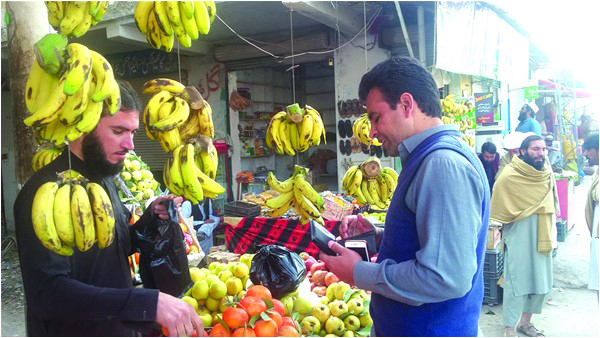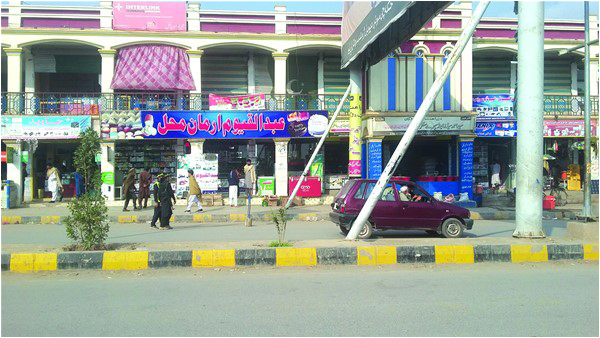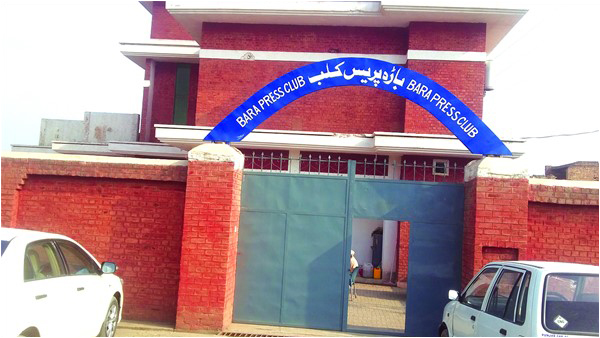
Once considered a stronghold for the Tehreek-e-Taliban Pakistan (TTP) and Lashkar-e-Islam Mangal Bagh group, the historical Bara Bazar has been underoing a revival. It is, in fact, passing through something of a renovation stage. All this is possible primarily because business and educational activities have resumed after a lapse of 10 years - driven by hopes for better living standards.
Situated 14 kilometres from Peshawar’s Saddar, Bara Bazar once was popular for the business of goods on which custom duties had not been paid - where people from far flung areas of Khyber-Pakhtunkhwa used to visit to get everything from cloth to weapons, electronic goods and auto parts. At that time there was great charm for tourists in this bazaar of the Khyber agency (now Khyber district).
However this attraction could not last forever and it was overtaken by gloom after the onset of fundamentalist militancy.

Several armed groups include Ansar-ul-Islam, Lashkar-e-Islam and Tehreek-e-Taliban remained active in an armed struggle to challenge the writ of the state while targeting the surrounding areas of Peshawar city - especially during the night, with heavy guns and rockets launchers. It was a time when Friday was considered “fixed” for suicide attacks in guest houses, sports grounds, bazaars and mosques. Cold-blooded murder had become the order of the day.
Today, despite the end of the worst fighting, a huge chunk of the population who were internally displaced from Tehsil Bara and the Tirah Valley are still struggling for survival. Many of them are engaged in efforts to rebuild their lives – often beginning with the reconstruction of their very houses.
Today, however, the historical Bara Bazaar presents a very different look as compared to even 2-3 years ago - when businesses lay in physical ruins, presenting the look of a war-torn region.

In recent visits, this scribe witnessed significant improvement sin business and education activities. People can be seen busily returning to some sort of normalcy – of which the most visible sign is the roaring trade done by shops and restaurants. Medical facilities and other public services no longer frisk people at entrances: security personnel are far fewer than during the time of active conflict.
In fact, it was difficult to find people with the time to speak for interviews, since most seemed far too busy to spare a few minutes!
Nevertheless, talking to the Friday Times, Abdul Haq a local fruit merchant confirms the general impression:
“With the mercy of God Almighty, business has been restored to a great extent and people have a sense of relief after passing through a very tough time. Since they had lived lives as displaced people, they had been paying very heavy rents. It was hard to establish businesses in other regions which they had fled to. Today after repatriation to their original homes, they are able to save some money to invest – as I did in this fruit business.”

Habibullah, who owns a fish shop, tells this scribe that as business activities slowly recover in the area, legal activities are now profitable too. “Earlier, most of the people were affiliated with dealing in smuggled products, but now many have quit illegal businesses and switched over to dealing in products like cloth, etc”
Investors from different parts of Peshawar are now taking an interest in renting out shop space and opening businesses in Bara Bazaar. Rents in other commercial areas are higher as compare to this Bazaar. Construction work – often reconstruction of damaged properties – is now proceeding rapidly.
People from other parts of Pakistan have begun to visit the Bara Bazaar again, too. The markets here retain their reputation for “reasonable prices” due to their association with cheap smuggled products in the popular imagination.
Locals, however, insist that there is a long way to go. Now, with the merger of the erstwhile Federally Administered Tribal Areas (FATA) into Khyber-Pakhtunkhwa province, the demands of local people are focused on improved municipal services. Proper drainage systems, sanitation and public health are top of the list of demands.
Moreover, there is a popular complaint that the government has not compensated these people in view of the material losses that they suffered during the brutal conflict. Having lost everything during security operations against the terrorist groups, many families continue to face an uphill task as they work to rebuild shattered lives.
Situated 14 kilometres from Peshawar’s Saddar, Bara Bazar once was popular for the business of goods on which custom duties had not been paid - where people from far flung areas of Khyber-Pakhtunkhwa used to visit to get everything from cloth to weapons, electronic goods and auto parts. At that time there was great charm for tourists in this bazaar of the Khyber agency (now Khyber district).
However this attraction could not last forever and it was overtaken by gloom after the onset of fundamentalist militancy.

Several armed groups include Ansar-ul-Islam, Lashkar-e-Islam and Tehreek-e-Taliban remained active in an armed struggle to challenge the writ of the state while targeting the surrounding areas of Peshawar city - especially during the night, with heavy guns and rockets launchers. It was a time when Friday was considered “fixed” for suicide attacks in guest houses, sports grounds, bazaars and mosques. Cold-blooded murder had become the order of the day.
Today, despite the end of the worst fighting, a huge chunk of the population who were internally displaced from Tehsil Bara and the Tirah Valley are still struggling for survival. Many of them are engaged in efforts to rebuild their lives – often beginning with the reconstruction of their very houses.
Today, however, the historical Bara Bazaar presents a very different look as compared to even 2-3 years ago - when businesses lay in physical ruins, presenting the look of a war-torn region.

There is a popular complaint that the government has not compensated these people in view of the material losses that they suffered during the brutal conflict
In recent visits, this scribe witnessed significant improvement sin business and education activities. People can be seen busily returning to some sort of normalcy – of which the most visible sign is the roaring trade done by shops and restaurants. Medical facilities and other public services no longer frisk people at entrances: security personnel are far fewer than during the time of active conflict.
In fact, it was difficult to find people with the time to speak for interviews, since most seemed far too busy to spare a few minutes!
Nevertheless, talking to the Friday Times, Abdul Haq a local fruit merchant confirms the general impression:
“With the mercy of God Almighty, business has been restored to a great extent and people have a sense of relief after passing through a very tough time. Since they had lived lives as displaced people, they had been paying very heavy rents. It was hard to establish businesses in other regions which they had fled to. Today after repatriation to their original homes, they are able to save some money to invest – as I did in this fruit business.”

Habibullah, who owns a fish shop, tells this scribe that as business activities slowly recover in the area, legal activities are now profitable too. “Earlier, most of the people were affiliated with dealing in smuggled products, but now many have quit illegal businesses and switched over to dealing in products like cloth, etc”
Investors from different parts of Peshawar are now taking an interest in renting out shop space and opening businesses in Bara Bazaar. Rents in other commercial areas are higher as compare to this Bazaar. Construction work – often reconstruction of damaged properties – is now proceeding rapidly.
People from other parts of Pakistan have begun to visit the Bara Bazaar again, too. The markets here retain their reputation for “reasonable prices” due to their association with cheap smuggled products in the popular imagination.
Locals, however, insist that there is a long way to go. Now, with the merger of the erstwhile Federally Administered Tribal Areas (FATA) into Khyber-Pakhtunkhwa province, the demands of local people are focused on improved municipal services. Proper drainage systems, sanitation and public health are top of the list of demands.
Moreover, there is a popular complaint that the government has not compensated these people in view of the material losses that they suffered during the brutal conflict. Having lost everything during security operations against the terrorist groups, many families continue to face an uphill task as they work to rebuild shattered lives.

